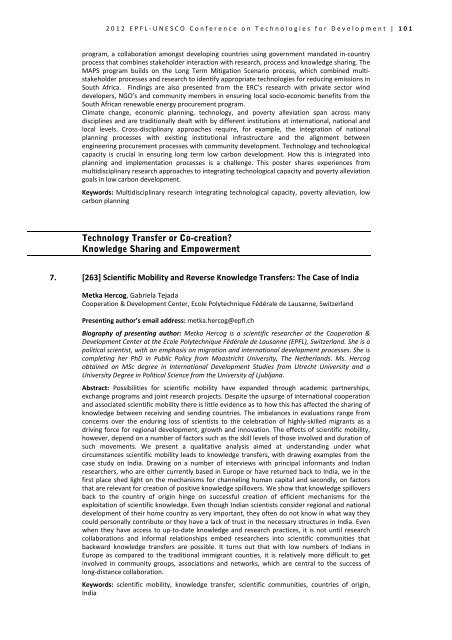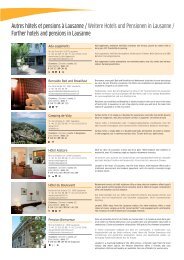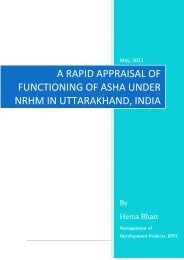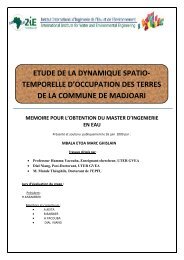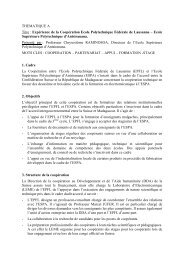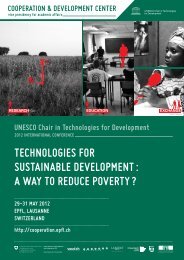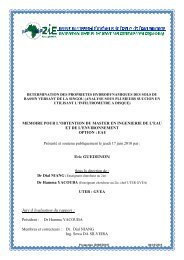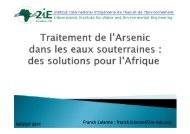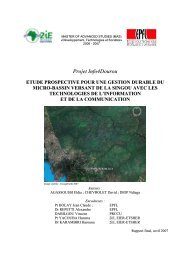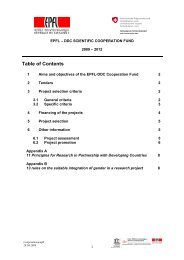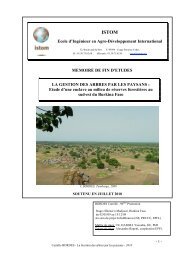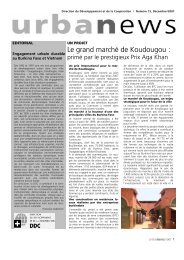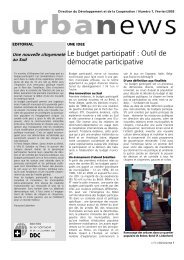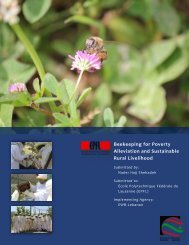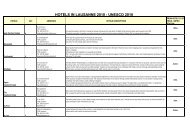TEChNOLOgIES FOR SuSTAINABLE DEVELOPMENT : A WAy TO ...
TEChNOLOgIES FOR SuSTAINABLE DEVELOPMENT : A WAy TO ...
TEChNOLOgIES FOR SuSTAINABLE DEVELOPMENT : A WAy TO ...
You also want an ePaper? Increase the reach of your titles
YUMPU automatically turns print PDFs into web optimized ePapers that Google loves.
2012 EPFL- UNESCO Conference on Technologies for Development | 101program, a collaboration amongst developing countries using government mandated in-countryprocess that combines stakeholder interaction with research, process and knowledge sharing. TheMAPS program builds on the Long Term Mitigation Scenario process, which combined multistakeholderprocesses and research to identify appropriate technologies for reducing emissions inSouth Africa. Findings are also presented from the ERC’s research with private sector winddevelopers, NGO’s and community members in ensuring local socio-economic benefits from theSouth African renewable energy procurement program.Climate change, economic planning, technology, and poverty alleviation span across manydisciplines and are traditionally dealt with by different institutions at international, national andlocal levels. Cross-disciplinary approaches require, for example, the integration of nationalplanning processes with existing institutional infrastructure and the alignment betweenengineering procurement processes with community development. Technology and technologicalcapacity is crucial in ensuring long term low carbon development. How this is integrated intoplanning and implementation processes is a challenge. This poster shares experiences frommultidisciplinary research approaches to integrating technological capacity and poverty alleviationgoals in low carbon development.Keywords: Multidisciplinary research integrating technological capacity, poverty alleviation, lowcarbon planningTechnology Transfer or Co-creation?Knowledge Sharing and Empowerment7. [263] Scientific Mobility and Reverse Knowledge Transfers: The Case of IndiaMetka Hercog, Gabriela TejadaCooperation & Development Center, Ecole Polytechnique Fédérale de Lausanne, SwitzerlandPresenting author’s email address: metka.hercog@epfl.chBiography of presenting author: Metka Hercog is a scientific researcher at the Cooperation &Development Center at the Ecole Polytechnique Fédérale de Lausanne (EPFL), Switzerland. She is apolitical scientist, with an emphasis on migration and international development processes. She iscompleting her PhD in Public Policy from Maastricht University, The Netherlands. Ms. Hercogobtained an MSc degree in International Development Studies from Utrecht University and aUniversity Degree in Political Science from the University of Ljubljana.Abstract: Possibilities for scientific mobility have expanded through academic partnerships,exchange programs and joint research projects. Despite the upsurge of international cooperationand associated scientific mobility there is little evidence as to how this has affected the sharing ofknowledge between receiving and sending countries. The imbalances in evaluations range fromconcerns over the enduring loss of scientists to the celebration of highly-skilled migrants as adriving force for regional development, growth and innovation. The effects of scientific mobility,however, depend on a number of factors such as the skill levels of those involved and duration ofsuch movements. We present a qualitative analysis aimed at understanding under whatcircumstances scientific mobility leads to knowledge transfers, with drawing examples from thecase study on India. Drawing on a number of interviews with principal informants and Indianresearchers, who are either currently based in Europe or have returned back to India, we in thefirst place shed light on the mechanisms for channeling human capital and secondly, on factorsthat are relevant for creation of positive knowledge spillovers. We show that knowledge spilloversback to the country of origin hinge on successful creation of efficient mechanisms for theexploitation of scientific knowledge. Even though Indian scientists consider regional and nationaldevelopment of their home country as very important, they often do not know in what way theycould personally contribute or they have a lack of trust in the necessary structures in India. Evenwhen they have access to up-to-date knowledge and research practices, it is not until researchcollaborations and informal relationships embed researchers into scientific communities thatbackward knowledge transfers are possible. It turns out that with low numbers of Indians inEurope as compared to the traditional immigrant counties, it is relatively more difficult to getinvolved in community groups, associations and networks, which are central to the success oflong-distance collaboration.Keywords: scientific mobility, knowledge transfer, scientific communities, countries of origin,India


